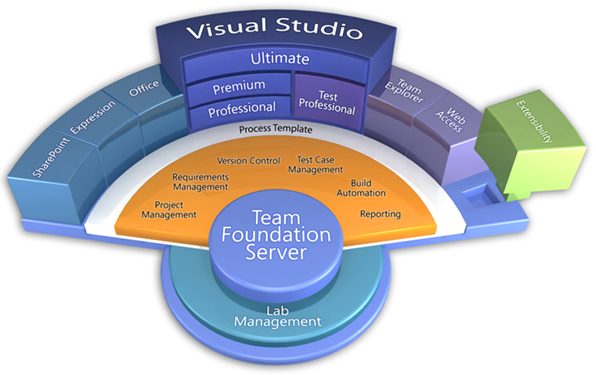Is project based team work becoming a logistical nightmare?
I have had a number of interesting discussions and questions this week regarding the facilitation of project based team working. From my recent Institution visits a number of institutions are now using tools such as Microsoft Project and Microsoft Project server within the teaching curriculum. They are predominantly using these applications to allow students to manage and monitor the status/progress of work on both individual and team based projects. Microsoft Project is a excellent tool however it doesn't plan development lifecycles or team activity or monitor output of individuals or as a team so I would like to suggest the use of Microsoft Visual Studio Team Foundation Server 2010.
Microsoft Visual Studio Team Foundation Services is the collaboration platform at the core of Microsoft’s application lifecycle management solution. Team Foundation Server 2010 automates the software delivery process and gives the students the tools they need to manage software development projects throughout the IT life cycle.
What more important is that is FREE if your a MSDNAA subscriber
For a comprehensive list of software available to your department and each student studying within it under MSDNAA see:-
https://msdn.microsoft.com/en-gb/academic/bb676724
Team Foundation Server 2010 enables everyone on the team to collaborate more effectively, be more agile and deliver better quality software while building and sharing institutional knowledge and allowing you the academic to see the status and progress and activity/commitment of each of the team members. This is facilitated by the use of project artifacts and data from work item tracking, source control, builds, and testing tools which are stored in a data warehouse and powerful reporting and dashboards provide historical trending, full traceability and real-time visibility into quality and progress against business intent.
Creativity UnleashedDesigned from the ground up as a collaboration platform to automate the software development process. Let Team Foundation Server 2010 manage your software development process and facilitate collaboration so that your teams are freed up from mundane non-coding tasks and empowered to unleash their creativity. |
Simplicity Through IntegrationTools, processes and project artifacts come together to simplify the collaboration of people across various functional disciplines, helping them work better together and be more productive. |
Quality Code EnsuredMonitor quality and progress in real time. Ensure that defects and regressions are discovered at the earliest possible moment with powerful features like build automation and gated check-ins. |
The collaboration platform at the core of Microsoft’s application lifecycle management solution. Visual Studio Team Foundation Server 2010 provides workflow automation and integrated processes, tools and project artifacts to simplify the collaboration of people across functional disciplines. The central repository enables rich collaboration in the context of the tasks the team is working on. |
Top Ten Reasons why to use Visual Studio Team Foundation Server
2. Lightweight Agile Planning Tools The new Microsoft® Excel Agile Planning Workbook makes it easy for teams to adopt agile software development methodologies like SCRUM. Use it to create and manage user stories and product backlog, estimate the team's velocity, and break the project down into iterations. The Iteration Backlog enables you to plan iterations and track progress. Smaller teams and individual developers can choose the new Basic Install option to leverage the power of Team Foundation Server 2010 without the footprint of the full installation. |
Windows Workflow-based builds with powerful features like build queuing and build agent pooling enable teams to easily customize, manage and scale out their build environments. 64-bit server support and new project collection isolation features let large teams scale Team Foundation Server 2010 installations to meet their demands giving students experience of real world applications, tools and services. |

